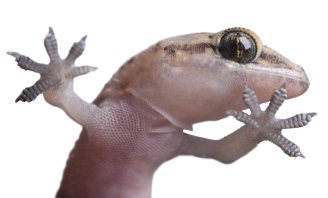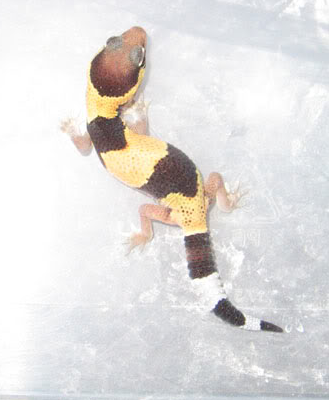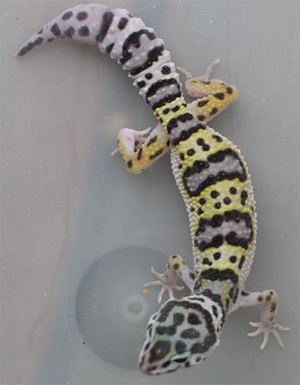This question is heard often and usually for one of two reasons: either the questioner has just gotten hold of a new enclosure and wants something to put in it, or someone who has successfully kept a gecko for the first time wants to expand to a new, different or more challenging species. As usual, the internet can be a wonderful resource in the quest for a new gecko species to keep, but it is just that, a resource, not a mind reader. An understanding about how to research acquiring and caring for a new gecko species will make the whole process more effective than just asking “What should I get?”
[ad#sponsor]
Thinking about the Enclosure
Whether you’re beginning your search for a new gecko because you have a new enclosure, or are interested in a specific gecko that will require a new enclosure, the characteristics of that enclosure go a long way to determine what kind of gecko you’ll eventually get. A horizontally oriented enclosure (longer than it is tall) is best for a terrestrial gecko while a vertically oriented one is for an arboreal species. Size is important as well: a 10 gallon tank will hold a single, medium sized gecko or several “micro” geckos. A 40 gallon tank will hold a pair of larger geckos or a larger colony of medium-sized geckos. More information about enclosure type and size can be found in our article Gecko Housing Considerations and Resources.
Thinking about the Gecko
Sometimes it’s the gecko itself that sparks the desire to acquire a new species. A new type of gecko seen at a pet store, in a thread on one of the reptile forums, on a breeder’s web page, advertised on craigslist or at a reptile show causes an instant response: “I want one of those!” My own first foray into acquiring a new gecko species, after I got my start with leopard geckos, came after reading an article about day geckos in Reptiles Magazine about 6 years ago. The centerfold, full-color pictures of gorgeous brightly colored day geckos sold me immediately and it only took a few months (and a lot of research) before I acquired a gold dust day gecko (P. laticauda) which I still own.
If you don’t know which gecko you want, just that you want something new, you can begin by thinking about some of the potential new gecko’s qualities: terrestrial or arboreal, desert or tropical, easy to care for or challenging, one that can be handled or one that is display only. If you can narrow your criteria by making decisions about your future gecko’s characteristics it will make the search much easier.
Do Your Research
As mentioned above, the internet is your friend, particularly the search engines and the many reptile forums that exist (To find out more about reptile forums, check our article on forums for gecko lovers. However, the internet is only a tool and you must ask the proper questions to get useful answers.
If you’re interested in a particular gecko species, use Google or another search engine and type in “[name of species] care”. This should direct you to a variety of sites with care sheets about the species that interests you. Read several care sheets and remember that not all care sheets are equal. If you are in the know about which sites are reliable, read the care sheets from those sites. If not, read several care sheets. Expect to find that most of the information is similar from care sheet to care sheet, while some of the specifics vary. A care sheet that differs from all the other care sheets you read in basic information is suspect and should usually be disregarded. The basic information that is similar across care sheets should give you a sense of whether or not the species you’re looking for has care needs that you can meet or want to deal with. If not, consider a different species. The details that vary among care sheets are the things that you may want to ask questions about on reptile forums. As an avid reader of several well-known reptile forums, I am much more responsive to a question like “Does a crested gecko do better on a newspaper or a coco fiber substrate?” than something like “How do you take care of a crested gecko?”
Once you’ve identified a gecko that interests you and whose care you feel you would like to take on, visit some reptile forums that have sub-forums dedicated to the species you’re researching. Read the threads and posts to get a sense of the issues surrounding the care and enjoyment of this species. If you have a specific question, post it on the forum. By reading the forums, you will get a sense of which posters are relative newcomers and which are experienced. Send a private message (PM) to posters whose opinions or expertise attract you. This is a good way to get a sense of the “personal” aspects of caring for this species and is best done once you’ve already finished the basic research and know what you may be getting into.
The same techniques can be used when you don’t know which species of gecko you’re interested in. Perhaps you just got a 40 gallon tank and want something to keep in it. Or you’ve always been interested in geckos but don’t know what kind to start with. Or you’ve kept leopard geckos for several years and want to move on to something different. In all these cases, you have to start by identifying a specific species, after which you proceed as described above. Once again, the internet will help: check out the gallery sections that are included in many reptile forums and look at pictures of different species to see what interests you. Use the search engine to locate specific species that meet your more general desires: “gecko for beginners”, “arboreal geckos”, “large geckos”, “desert geckos” (I have “googled” each of these phrases and found appropriate internet sites within the first 5 listings). These more general searches should lead you to specific species that are worth checking out. Then it’s back to the reptile forums, the care sheets and the images to determine if you like what you are seeing.
Here to Help

Most reptile enthusiasts who post on reptile forums are eager to help newcomers (to the hobby or to a specific species) learn how to acquire and care for their pets. The more focused your questions are, the more effectively they can help you. If you begin by doing some research of your own, so you have meaningful, specific questions to ask, you should find that you get useful, high quality answers. Who knows, perhaps one day you’ll be shepherding a “newbie” into the wonderful world of a gecko species you’ve come to love.
[ad#300]




I highly recommend the Repashy Reptiles Forums for any of the rhacodactylus species (crested geckos, gargoyles, leachies…etc.) plus other species as well. Great community and I never would have learned so much. Come check us out and let em know sakasuvaki referred you!
Wonderful article. Well written and informative. If I may, I too would offer the Repashy Forum as a great starting point to ask questions. The forum is focused on the Rhacs (crested geckos, leachies, etc) but also provides info on so much more.